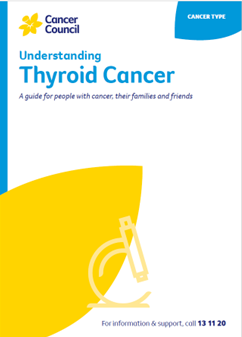- Home
- Thyroid cancer
- Treatment
- Radioactive iodine treatment
Radioactive iodine treatment
This treatment is sometimes called radioactive iodine ablation or thyroid ablation.
Learn more about:
- Overview
- When to have RAI treatment
- Preparing for radioactive iodine treatment
- Having radioactive iodine treatment
- Safety precautions in hospital and at home
- Side effects of radioactive iodine treatment
Overview
Radioactive iodine (RAI) is also known as I-131 and is a type of radioisotope treatment. Radioisotopes are radioactive substances given as a tablet or capsule (sometimes a liquid). Radioactive iodine treatment is given in hospital, and takes a few days.
Although RAI spreads through the body, it is mainly absorbed by thyroid cells or thyroid cancer cells. RAI kills these cells while having little effect on other body cells. You may be given RAI to destroy tiny amounts of remaining cancer cells or healthy thyroid tissue left after surgery. It is usually suggested for papillary, follicular or oncocytic thyroid cancers that have spread to lymph nodes or have a high risk of coming back (recurring) after surgery.
RAI isn’t usually given for smaller cancers that have not spread. It does not work for medullary or anaplastic thyroid cancers, because these types of thyroid cancer do not take up iodine.
When to have RAI treatment
RAI is generally not given until weeks or sometimes months after surgery. You will wait until any contrast dye from CT scans has left your system and any swelling from surgery has gone down (swelling can affect the blood flow and stop the RAI circulating well).
It is not safe to have RAI treatment if you are pregnant or if you are breastfeeding. If you are pregnant or breastfeeding, treatment will be delayed. In this case, you may be able to wait 6 months or even longer after surgery before starting RAI treatment. Ask your doctor for more information about the timing of your treatment.
Preparing for radioactive iodine treatment
Limit foods high in iodine
A diet high in iodine makes RAI treatment less effective, so you need to avoid high-iodine foods from 2 weeks before treatment. This includes seafood, iodised table salt, sushi, some dairy foods and certain food colourings. Your treatment team will give you more detailed instructions about what to eat.
Discuss imaging scans
CT scans and other imaging scans sometimes use an injection of a dye called contrast to make the images clearer. This contrast can interfere with how well RAI works, so it is important to tell your doctor if you have had a scan using contrast in the month before RAI treatment.
Raise TSH levels
For RAI treatment to work, you need a high level of TSH in your body. There are 2 ways to increase your TSH levels:
- Have rhTSH (Thyrogen) injections – You may be prescribed a synthetic type of TSH called recombinant human thyroid-stimulating hormone (rhTSH), also known by the brand name Thyrogen. You will need 2 injections of Thyrogen, usually into the muscle in your buttock (bottom). The first injection is given 2 days before RAI treatment, and the second injection the day before RAI treatment. Thyrogen allows you to continue taking your thyroid hormone replacement medicine.
- Stop taking thyroid hormone replacement medicine – In certain circumstances you may be told to stop taking your thyroid hormone replacement medicine for 3–4 weeks, though this is not common. You will have a blood test before RAI treatment to check that your TSH levels have risen enough. In some people, stopping their hormone replacement medicine causes symptoms of hypothyroidism. These symptoms may affect your ability to concentrate, so check with your doctor whether it is safe to drive and use heavy machinery. Some people may first be given T3 therapy (tri-iodothyronine) to reduce symptoms, and then stop taking it about 10–14 days before having RAI treatment.
The option recommended for raising your TSH levels will depend on your stage of disease and what is suitable for you. Your specialist will explain this, and when to start taking your T4 medicine after treatment.
→ READ MORE: Having RAI treatment
Podcast: Making Treatment Decisions
Listen to more of our podcast for people affected by cancer
More resources
A/Prof Diana Learoyd, Endocrinologist, GenesisCare North Shore, Faculty of Medicine and Health, University of Sydney, NSW; Emeritus Professor Leigh Delbridge AM, The University of Sydney, Thyroid Surgeon, The Mater and North Shore Private Hospitals, NSW; Prof Ruta Gupta, Tissue Pathology and Diagnostic Oncology, Royal Prince Alfred Hospital and The University of Sydney, NSW; Susan Leonard, Cancer Nurse Coordinator Thyroid and Brachytherapy, Cancer Care Services, Royal Brisbane and Women’s Hospital, QLD; Dr Dean Lisewski, Endocrine and General Surgeon, Fiona Stanley Hospital and St John of God Hospital, Murdoch, WA; Caitriona Nienaber, 13 11 20 Consultant, Cancer Council WA; Jonathan Park, Consumer; A/Prof David Pattison, Deputy Director and Senior Staff Specialist, Department of Nuclear Medicine and Specialised PET Services, Royal Brisbane and Women’s Hospital and School of Medicine, University of Queensland, QLD; Prof Bruce Robinson, Endocrinologist, Co-Head, Cancer Genetics, Kolling Institute of Medical Research, The University of Sydney and Royal North Shore Hospital, NSW; Marissa Ryan, Team Leader (Cancer) Pharmacist, Princess Alexandra Hospital, Brisbane, QLD.
View the Cancer Council NSW editorial policy.
View all publications or call 13 11 20 for free printed copies.
Need to talk?
Support services
Coping with cancer?
Ask a health professional or someone who’s been there, or find a support group or forum
Need legal and financial assistance?
Pro bono legal and financial matters, no interest loans or help with small business
Cancer information
Making cancer treatment decisions
Decision-making steps, consent and second opinions
Where to find clinical trials
Links to information about current clinical trials of new therapies

